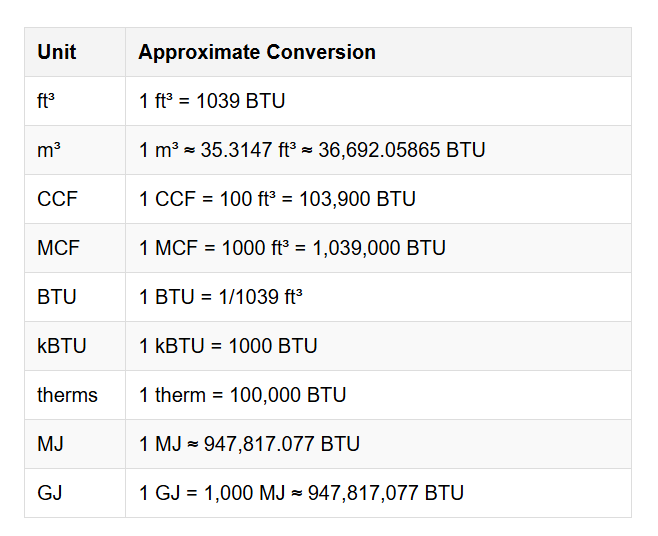 Home
Home
 Back
Back

Definition: This calculator converts quantities of natural gas between volume units (e.g., ft³, m³, CCF, MCF) and energy units (e.g., BTU, kBTU, therms, MJ, GJ), based on an energy content of 1039 BTU/ft³ (103,900 BTU/CCF or 1.039 therms/CCF). As shown in the formula image above, users input a quantity and unit, and the calculator outputs equivalent values in multiple units, formatted to 5 decimal places.
Purpose: Essential for energy professionals, engineers, and consumers to standardize natural gas measurements for billing, energy trading, or efficiency calculations.
The calculator converts the input quantity to a base unit (ft³ for volume, BTU for energy) and then to all output units, using standard conversion factors:
Units and Conversions:
| Unit | Type | Approximate Conversion |
|---|---|---|
| ft³ | Volume | 1 ft³ = 1039 BTU |
| m³ | Volume | 1 m³ ≈ 35.3147 ft³ ≈ 36,692.05865 BTU |
| CCF | Volume | 1 CCF = 100 ft³ = 103,900 BTU |
| MCF | Volume | 1 MCF = 1000 ft³ = 1,039,000 BTU |
| BTU | Energy | 1 BTU = 1/1039 ft³ |
| kBTU | Energy | 1 kBTU = 1000 BTU |
| therms | Energy | 1 therm = 100,000 BTU |
| MJ | Energy | 1 MJ ≈ 947,817.077 BTU |
| GJ | Energy | 1 GJ = 1,000 MJ ≈ 947,817,077 BTU |
Steps:
Natural gas conversion is critical for:
Example 1: Convert 100 CCF of natural gas to other units:
Results:
Example 2: Convert 500 therms of natural gas to other units:
Results:
Q: What is a natural gas converter?
A: A natural gas converter transforms measurements of natural gas between volume units like cubic feet or cubic meters and energy units like BTU or therms, based on the gas’s energy content.
Q: Why convert between volume and energy units?
A: Volume units measure the physical amount of gas, while energy units reflect the heat or energy produced, critical for billing and efficiency calculations.
Q: What is a therm?
A: A therm is a unit of heat energy equal to 100,000 BTU, commonly used by gas companies to measure energy content.
Q: Why is the energy content of natural gas variable?
A: The energy content varies due to differences in gas composition and conditions, but a standard value of 1039 BTU per cubic foot is used here for conversions.
Q: Can I use this for real-world billing?
A: Yes, but verify with your gas supplier for the exact energy content, as it may differ slightly from the 1039 BTU per cubic foot used here.